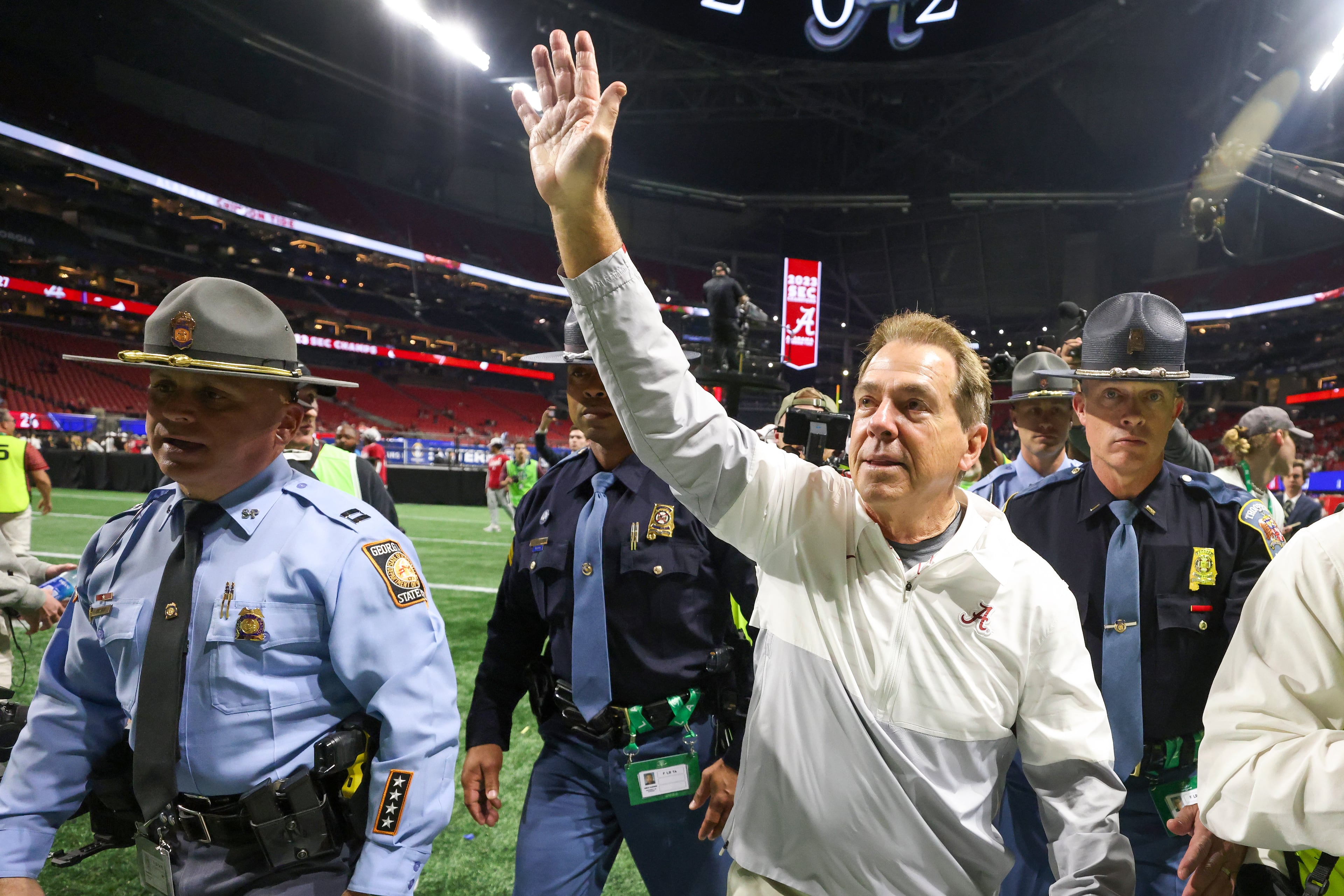Alabama’s legendary coach Nick Saban confirms he is retiring

Nick Saban’s coaching reign has come to an end. His dominance over college football, however, will forever linger in the lore of the sport.
Saban, who won seven national championships — more than any other major college football coach — and turned Alabama back into a national powerhouse with six of those titles in just 17 seasons, has confirmed he is retiring.
“The University of Alabama has been a very special place to Terry and me,” Saban said in a statement released by the school. “We have enjoyed every minute of our 17 years being the head coach at Alabama as well as becoming a part of the Tuscaloosa community. It is not just about how many games we won and lost, but it’s about the legacy and how we went about it. We always tried to do it the right way. The goal was always to help players create more value for their future, be the best player they could be and be more successful in life because they were part of the program. Hopefully, we have done that, and we will always consider Alabama our home.”
Alabama defeated Georgia 27-24 in the SEC Championship game Dec. 2 at Mercedes-Benz Stadium and lost to Michigan 27-20 in the Rose Bowl in a College Football Playoff semifinal on Dec. 31.
Bulldogs coach Kirby Smart was a long-time assistant under Saban with the Crimson Tide, LSU and the Miami Dolphins. Saban had a 5-1 record coaching against Smart at UGA.
Georgia will play Alabama in the Bulldogs’ fourth game of the 2024 season.
Saban is 297-71-1 as a college head coach.
The 72-year-old Saban restored a Crimson Tide program once ruled by Paul “Bear” Bryant to the top of college football after taking over in 2007. His decision to step away was reported Wednesday, first by ESPN and then by other outlets, ending a career that has produced numerous titles and helped launch or relaunch the head coaching careers of Georgia’s Kirby Smith, Texas’ Steve Sarkisian and Mississippi’s Lane Kiffin.
He finished just shy of the top in his final season, leading the Tide from a shaky start to a Southeastern Conference championship and back into the College Football Playoff before falling in overtime to Michigan in a semifinal game at the Rose Bowl.
Saban led the Tide to nine Southeastern Conference championships and won his first national title at Alabama with a 14-0 season in 2009. Titles came again in 2011, 2012, 2015, 2017 and 2020. He also won the SEC with LSU in 2001 and 2003.
“Simply put, Nick Saban is one of the greatest coaches of all time, in any sport, and The University of Alabama is fortunate to have had him leading our football program for the past 17 seasons,” said Alabama Director of Athletics Greg Byrne. “Throughout his career as a head coach, his teams have won seven national championships, 11 conference championships and 312 games, and he’s developed an NCAA-record 49 NFL first-round draft picks and, most importantly, hundreds of college graduates. He is the consummate coach, mentor and leader, and his impact is felt far beyond the football field.
Coach Saban and Ms. Terry have touched countless lives in our community and the state of Alabama with the work they’ve done through the Nick’s Kids Foundation. While his time as our coach may have come to an end, his legacy will live on forever. What an honor it has been for us to have a front-row seat to one of the best to ever do it. A truly remarkable career for Coach Saban.”
Saban made a two-year foray into the NFL with the Miami Dolphins before returning to college football to revive one of college football’s most storied programs, which hadn’t won a national title in 15 years. Saban is 297-71-1 as a college head coach, with stops at Toledo, Michigan State and LSU, where he also won a national title. But Alabama is where he cemented his status as one of college football’s greatest coaches.
Saban coached Alabama’s first four Heisman Trophy winners and churned out numerous NFL players, going 206-29, a winning clip of 87.7%. His teams produced 44 first-round draft picks, including last year’s No. 1 quarterback Bryce Young.

During that span, he also adapted to the changing times of up-tempo offenses, churning out high-scoring teams after winning with some of the nation’s best defenses, along with the new NIL and transfer rules.
He led Toledo to a Mid-American Conference championship in 1990, his lone season as that program’s head coach. Saban worked as Bill Belichick’s defensive coordinator with the NFL’s Cleveland Browns for four seasons before becoming the first Michigan State coach to lead his first three teams to bowl games and then taking LSU to the 2003 national title.
His latest team dealt with plenty of adversity early on, including a loss to Texas, but rebounded with the emergence of quarterback Jalen Milroe to upset then-No. 1 Georgia in the SEC championship game.
Saban didn’t sound like a coach looking to give up the job any time soon after the game. But it wasn’t a bad way to go, even without the title.
“This is one of the most amazing seasons in Alabama football history in terms of where this team came from, what they were able to accomplish and what they were able to do, winning the SEC championship, and really, really proud of this group,” he said.
“I just wish that I could have done more as a coach to help them be successful and help them finish, and all we can do now is learn from the lessons that sometimes failings bring to us.”
Alabama Coach Nick Saban
Coverage from the AJC
Mark Bradley: The great Saban has left the building



